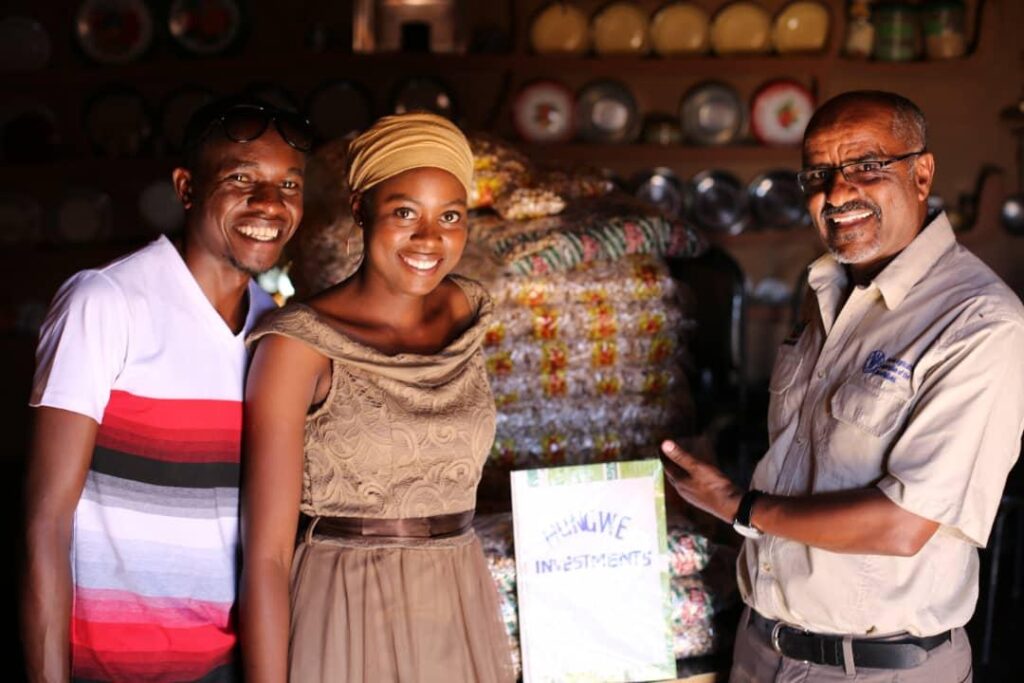Thabani Nyoni and his wife Chiedza live in Ward 12, in Zimbabwe’s Kwekwe district. They have transformed themselves from typical farmers into biofortification champions.
Thabani has been relying on farming as his main source of income. “I have not been employed because I failed to complete my teacher training course, due to financial challenges. I had to change my focus and strategically ventured into agriculture since I had the land to practice farming. Ever since I started this journey, I have not looked back and I am happy with my progress to date,” he said with confidence.
Thabani has been growing orange maize since 2018 when HarvestPlus, through the Zimbabwe Livelihoods and Food Security Programme (LFSP), introduced the crop to his district. When he ventured into this initiative, he grew 2 kg of orange maize, which was given as test packs by the project on 0.1 hectares. At least 2692 farmers (1381 females 1311 males) in Kwekwe District received taste packs during the same year. The major reason for giving out test packs was to give farmers an opportunity to try out this new variety of maize in their field as a way of encouraging adoption. In 2019/20 season, Nyoni grew 40kg of orange maize, harvested 4.5 tons of grain, which he used to produce maputi (a popped maize snack), and kept one ton for home consumption.
In Kwekwe district, the initiative was organized under LFSP, through the Extension and Training for Rural Agriculture (EXTRA) consortium. The United Kingdom government through the Foreign, Commonwealth & Development Office (FCDO), funds the program. The Food and Agriculture Organisation of the United Nations (FAO) and Palladium manage LFSP, whilst HarvestPlus is the programme technical partner on biofortification.
Thabani and Chiedza received training on growing biofortified crops, with emphasis on vitamin A orange maize and its nutritional benefits. Realizing that orange maize could be processed and value added into maputi (snacks) as easily as white maize, Thabani with financial support from his parents started his maputi (snacks) making business together with his wife.
“We attended trainings that were organized by the programme and these included biofortification and nutrition, business management and good agricultural practices,” he said.
In order for biofortification to be sustainable, and to reach people widely, there is a need to have more people speaking about its benefits. Thabani is one such biofortification champion. Such champions are integral to building and sustaining biofortification in their districts and the country at large.
“I had no idea about orange maize before. Initially I thought it was yellow maize. I am now very knowledgeable after my interaction with Nyoni and staff members from HarvestPlus and LFSP Extra consortium. I learned that orange maize is rich in vitamin A which is good for our health, skin and good eye sight,” said Rumbidzai Ndlovu from Ward 12.
Thabani has been very industrious in imparting the health and associated benefits of vitamin A orange maize to members of his community. He managed to influence a number of people in his community as well as seven maputi producers from surrounding areas to grow and consume vitamin A orange maize. As a grassroots champion, his advocacy not only benefits his district, but his efforts is inspiring other youth agripreneurs across the country.
Currently, the couple produces between 100 to 200 packs of 20 orange maize maputi daily which they sell to nearby schools and shops, cross boarder traders for USD 1.50 each. However, their production was affected by the COVID-19 pandemic, which resulted in closure of schools. Thabani’s thriving business has recorded a profit of USD 27,000 ever since it started in 2018.
“Our business has been generating good profit since our market base was also growing. However, business is currently low due to the pandemic and the measures taken to control the pandemic like lockdown saw schools closing for about 8 months. Nevertheless, we are happy with the money we are getting,” said Thabani.
“We have managed to secure three hectares of land on lease basis where I will be growing maize this 2020/21 farming season. Two hectares will be under orange maize whilst a hectare will be under white maize,” he explained.
Thabani has managed to pay tuition for his three sisters, who are pursuing their degree programs with different tertiary institutions, from the proceeds of their business. “Our seven bedroom house is under construction and I have a good standing with my in-laws after paying lobola (the customary token paid by the groom-to-be when he is about to marry his bride- to- be to his in-laws) for my wife. We also use the profits to sustain our day to day household needs,” he explained.
He manages the production process as well as the overall management of the business. Two youths are now employed as part time packers. Chiedza is mainly responsible for marketing the maputi to local shops and school tuck shops. Though they are currently using generic packaging for their maputi, they dream of launching their own uniquely packaged biofortified maputi brand. In the near future, Thabani and Chiedza intend to register their company, Hungwe Investments, as the first step to expanding their business beyond their community.
“Knowledge around the health benefits of consuming orange maize maputi, record keeping and basic business management is very crucial in my business. I learnt how to dream big and to prepare for the big dream when it becomes a reality,” said Chiedza.
